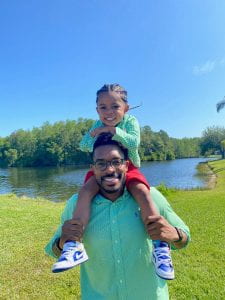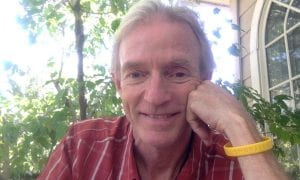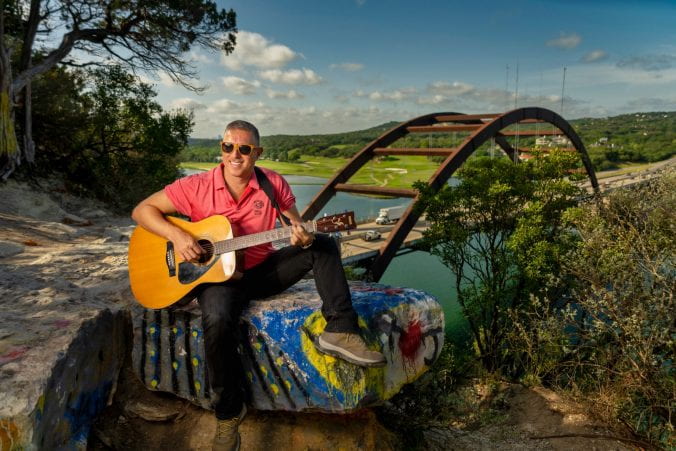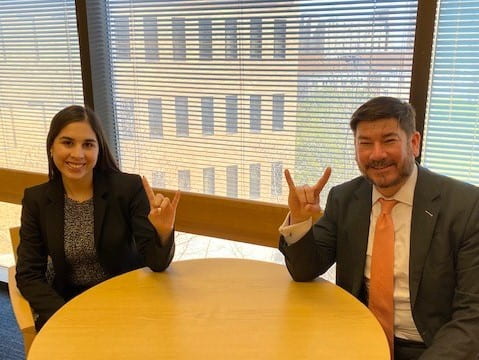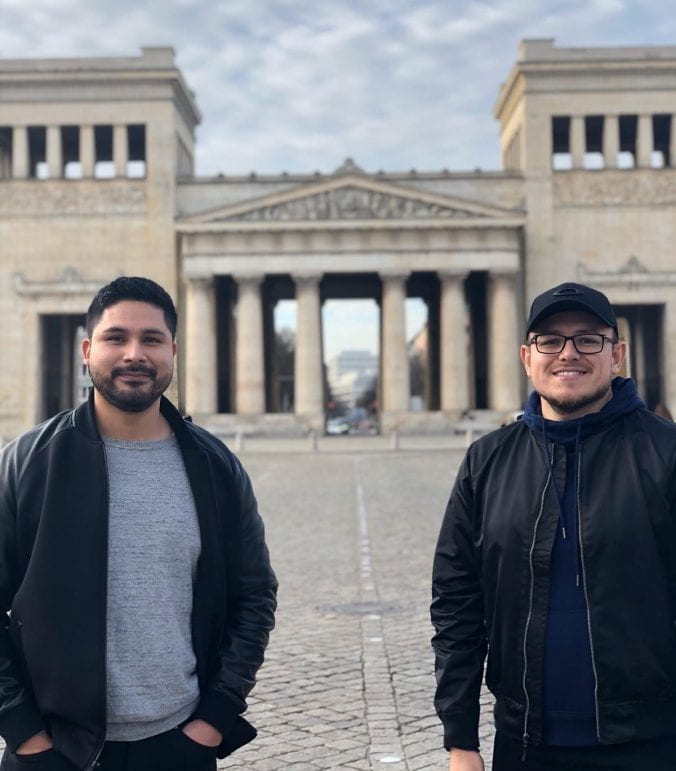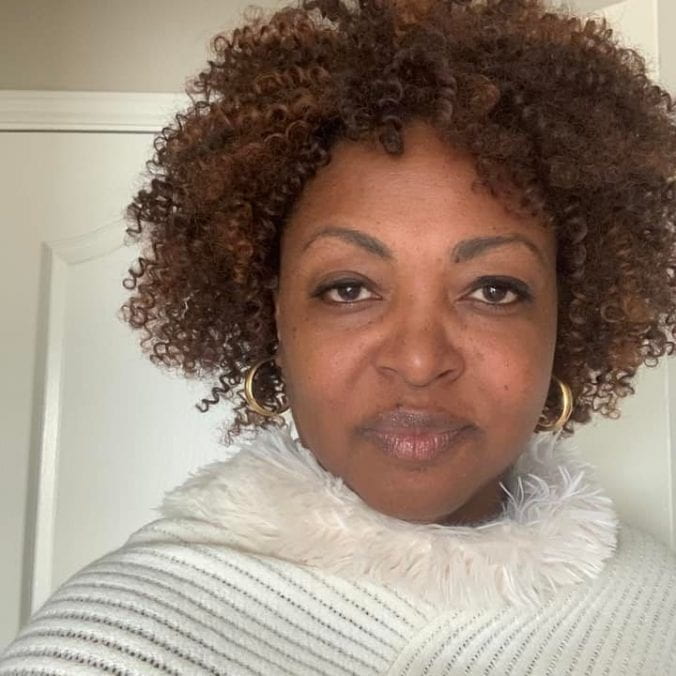Luis Pablo Rhi, BBA ’98, is a director, portfolio manager, and senior analyst for the Dallas-based firm, Barrow Hanley Global Investors. As a student at McCombs, he was part of the initiating class cohort for the Financial Analyst Program. Since graduating, he has become very involved as an alumnus, serving on the Dean’s Advisory Council, BBA Advisory Board, McCombs Real Estate Investment Fund Advisory Board, and as an executive board member for the New York for McCombs Council and Wall Street for McCombs Board. In addition, he has also funded in his parents’ names, the Dr. Pablo and Teresa Rhi-Perez Endowed Scholarship in Business for prospective students of the Rio Grande Valley in South Texas to pursue a “best in class” business education at McCombs, and the Luis Pablo and Christine Rhi UT Female Athlete Scholarship.
Abigail Castro, class of 2024, is the current recipient of the Dr. Pablo and Teresa Rhi-Perez Endowed Scholarship in Business and, at the time of this publication, a student assistant working for the McCombs Alumni and Donor Services office. We invited Abigail to take the lead on this interview in order to create a unique opportunity for her and Luis to connect on their shared background growing up in the Rio Grande Valley, and on their shared desire to positively impact their South Texas community for future generations.
Abigail Castro: Hello, my name is Abigail Castro, I’m a sophomore studying finance, and I’m from Brownsville, TX. Would you like to introduce yourself?
Luis Pablo Rhi: My name is Luis Pablo Rhi and I’m also from Brownsville. I’m a McCombs grad, graduated in class of 1998 with a BBA and as a finance major. I was in New York for 20 years, worked on Wall Street for BNY Mellon as a senior portfolio manager and co-head of the large capitalization investment management group. In 2017, I moved to Dallas to work for Barrow Hanley, which I am currently a director, portfolio manager, and senior analyst.
Abigail: Please talk about your experience as a student here at McCombs. Why did you decide to come here, what groups were you involved in, and what was your favorite class or professor?
Luis: It all started with my father. He was a PhD candidate at McCombs, finishing his degree in the mid-1980’s. As little kids, we would come to Austin while he was finishing his dissertation and spent a lot of time on campus. My father also had a lot of relationships with former professors at the school and was very much involved with some of the senior administrative people at the university, so he had a lot of ties to the school.
After graduating high school, I spent one year at the University of Texas at Brownsville. Then, when the time was right for me to transfer to another school, UT-Austin was always in sight.
My first encounter as a student was overwhelming, having been brought up in a small town where you knew almost everybody. My first class was BA101 with almost 800 students, so it was very different to what I was used to, but over time I started to get more involved in different organizations.
HBSA (Hispanic Business Student Association) was one of them. The Mexican Student Association, the economics club, and the finance association were other ones. I started to expand my horizons in terms of meeting more people and trying to push that small-town mentality away, and just be part of a larger group in university.
During my senior year, the financial analyst program was created, and I was part of the initial class. Some of my favorite classes were in the financial analyst program where the classes had lots of team exercises, so there was a lot of team building and some of those friends are still long-term friends. To this day I still cherish those relationships.
Abigail: You said that you’re from Brownsville, so being that I am also from Brownsville, what would you say you learned growing up in a small town? How did that affect your time here at UT? What did you learn from it, and did it help with your education, your career, and just your involvement in general?
Luis: Growing up in a small town, especially coming from a Hispanic family, there’s a lot of accountability, especially being the oldest. I think it gave me confidence. With such a small environment, I was involved in many organizations, and leadership roles.
I was also a high school athlete, so team-work was always at the center. Working in teams, make you realize that relationships are very important. When I came to Austin, even though it was overwhelming at the beginning, I knew that starting to work on relationships and networking are big components of that environment.
I think that growing up in a small town really helped me understand that there’s a bigger picture, or that there’s bigger groups and you have to work on being part of those groups.
Abigail: With that being said, did you ever experience a culture shock, and if so, how did you overcome that?
Luis: Yes, so with my first culture shock, I mean, I knew a couple of the professors on a first name basis because of my father’s relationships. After I went to my first marketing 101 class, I went and talked to the professor at the time in their office hours and I wanted to go in to introduce myself. (By the way, the class was 200 people).
The first thing the professor said was, “What’s your student ID number?”, not my name, and I thought well, okay, I need to really work on him so he can know my name, and not just the student number. I think that was one of the biggest cultural shocks, but I think a lot of the experiences at UT helped me overcome fear.
I’m an introvert by nature, but being at UT you do have to be an extrovert if you want to develop that network and then when I moved to New York, it was very easy. So that experience transpired in New York and not only for the business environment, but also from friendships.
Abigail: I’m kind of an introvert myself so coming here was kind of scary, and especially since my first year was online. I had to meet everyone through Zoom, and that wasn’t as welcoming. Then coming here in person was just a whole new experience.
It’s here that I started to join organizations in order for me to develop relationships and start making connections and study buddies, especially in the business school. It’s kind of like a social network, but one that will help you build a better future. Meeting everyone at McCombs went surprisingly well because I had heard rumors that business students only seek things for themselves and they are not necessarily very helpful, but I was very pleasantly surprised that was not the case.
Everyone I have met so far has been willing to help, and have been super kind and sweet. You mentioned that your experiences here helped you overcome your introversions and eventually helped you in New York. My next question is how did your educational experiences here change you or prepare you for your career?
Luis: It changed me not only by learning the theory and basics of finance, but also in learning how to interact with people, working with teams, being accountable, and having the collaboration and relationships with people from different backgrounds.
We get to meet with very different people from different backgrounds and experiences, so that is one aspect that transpired into the business. The power of the UT network is also very strong, and it’s not only in places like Dallas and Houston. It’s in New York, and it’s all over the world. I did business in Brazil and in Europe, and a lot of it was through alumni or fellow Longhorns that opened the door.
Abigail: Can you please provide a brief summary of your career path since graduating?
Luis: I was originally going to go work for Salomon Brothers, but then two days before graduation they called me and they said we’re canceling the emerging markets banking program. It was kind of a challenge because I already had an apartment lined up in New York. I had roommates. I already had my line of sight, so it was a bit of a road block, and this is one of the most important aspects of business and relationships: Never shut a door. Always keep that network open.
I went back to Bank of New York (where I had worked during the summer), asking advice to some of the former bosses that I worked for and they basically said, “when can you start?”. They also asked me to pick the area that I wanted to work in, which turned out to be investment management. That’s another lesson: Keep your network and keep continuing to work on your network.
The second thing is that in the investment world back then, there was a lot of emphasis in technology, media, and communications, so that was the fad. With me being from Texas, there was a void in the energy space, so I figured I’ll cover energy. There wasn’t a lot of action in energy, but I just kept learning and recommending investment opportunities in the sector. Then we had a transition where technology, media, and telecom go to the wayside, and then energy is now the leading investment opportunity. I’m sitting in a boardroom with all the investment people at the bank and the chief investment officer asks the question: where’s our energy guy? I’m in the back of the room and my boss looks at me and invited me to present. Next thing you know, we have an eight-year rally in energy and made a lot of money for clients. I was given more responsibility, and I was co-managing a couple of the mutual funds for Bank of New York.
Then in 2007, they announced a merger with Mellon, which was a kind of scary time because it was the start of the financial crisis. I wasn’t sure if I was going to be employed. With any merger, there’s always uncertainty and redundancies in groups, but we had a strong track record with our group. When it was all said and done, they decided to keep us. We grew a business of about $400 million under management to about $15 billion. I left BNY Mellon in 2017, and for personal reasons I wanted to come back to Texas.
At the time I had been talking informally to Barrow Hanley for about five years. I was looking at going into the corporate world and going to work for one of the energy companies. The guys at Barrow Hanley got a whiff of that and they called me up. I moved to Barrow Hanley in 2017 and I’ve been there ever since, and I’m responsible for the investments in the energy, utilities, and real estate sectors.
Abigail: Were there any resources besides your educational experiences at McCombs that you utilized that allowed you to prepare or further your career?
Luis: I held leadership roles in the Mexican Student Association, was involved in the Finance Association, and The Economics Club. That taught me about responsibility, budget management, rallying people, and organizing events with potential employers. Those leadership roles definitely helped me gain confidence in my abilities.
Abigail: You’ve had many accomplishments throughout your career. What are you most proud of?
Luis: I think the proudest accomplishment is to give back to some of the organizations that helped lead me onto this path. One of the most fulfilling things is sitting in front of me now, with you being the recipient of one of our scholarships. The other thing is having mentored a lot of McCombs students by helping them get into a job, and helping them get their bearings to land a career. When you see them a couple years down the road and they come and thank you, it’s just very rewarding.
Abigail: I just want to thank you for inspiring me as well, because it motivates me to want to help other individuals in the future, and especially students like me from the Valley. I also want to be able to give back to my community and give students like me the opportunity to get out of the Valley.
Although I love the Valley, I’m fortunate to come and experience diversity, and a bigger college experience. So I thank you for your generosity, your inspiration, and your willingness to always lend a hand. My next question is, how did you figure out what you wanted to do? Did you change your mind throughout the process or did you just know from the beginning?
Luis: The very funny thing is I took an economics class in high school and part of that class was a stock market game, so that kind of peaked my interest in the capital markets. Then my grandfather’s sister passed away my freshman year and there were a lot of certificates of former companies and bonds, and so that kind of peaked my interest in that.
Analyzing, researching, and the passion of making money in the markets is a big component of my interests that I was very lucky to already have when I entered school so that I was able to see the career path that I wanted to follow. I was passionate about it, and that’s the big advice I would give to any student: find out what you’re passionate about and run with it. Money is not enough motivation for driving a career. Some people are ambitious, but at the end of the day, if you’re passionate about what you do, success will follow.
Abigail: My parents give me the same advice, and say that you don’t want to have to sit and do a job that you’re not going to enjoy for the rest of your life. You may be making money, but if you’re not happy, what are you going to do with that money?
I’m just trying to find a career that I really want to do that I’m passionate about, and I really enjoy my time here at McCombs because they make you explore other majors before you declare your major.
My next question for you is, has your career played out the way you expected it to, or were there any surprises along the way?
Luis: There are always challenges in a career path and the important thing to anticipate is that you are going to have roadblocks, and there are two things that you can do to be successful in navigating through that.
Number one, is to be consistent, and to focus on your passion. Things are not going to go your way all the time, but if you’re patient enough and you’re determined, then they will move in the right direction. The motto should always be: Focus on the prize!
Second of all, I’ve learned that there are certain things that I cannot control. There’s a lot of things that are exterior and you need to be astute enough to not let it bother you or discourage you. You know, I can tell you about the financial crisis in 2008. Nobody foresaw that. Those are things that are out of your control. The thing is, you always have to have something to fall back on, or try to have a Plan B as you get further along in your career.
Abigail: That’s what I’m trying to do now. My major is finance, but I decided to minor in real estate because I know that if finance doesn’t work out for me, I want to have something I can probably do back at home, or anywhere.
I’m also considering law school, so I think that getting my degree in finance and then having that minor in real estate, and then eventually pursuing law will keep my options well-rounded in case one doesn’t work out. I agree that is really important to do.
Is there any advice that you can give new graduates, either in general or for those specifically wanting to have the career that you have?
Luis: One of the things that McCombs has been striving for is for students to reach out to alumni. I can tell you from an alumni perspective that there is a lot of enthusiasm on the alumni to get involved with students and to have those conversations so that the students can explore their different career paths. They understand what kind of options students have, so I would encourage the students that if there’s mentor programs, take advantage of those.
Take advantage of the networking events, and you know there’s a lot of events that happen on campus. If you’re in finance, you know there’s a real estate fund and you can attend those meetings. There’s the New York for McCombs program, and there’s the banking program. There’s a lot of alternatives that the school gives you opportunities to explore and talk to the actual people that are in the field.
Again, the number one advice that I give every student is find what you’re passionate about and then run with it.
Abigail: I know that you’re actively involved with McCombs. You’re on the BBA Board, so is there anything else you do to actively stay involved at McCombs and what motivates you to give back to the school?
Luis: Well, I’m not only on the BBA Advisory Board, I’m also in the Dean’s Advisory Council. I’m in the mentorship program, and I’ve been involved with the 40 Hours for Forty Acres fundraising program.
We do have the scholarships not only in McCombs, but we have one in the athletic department that is also for South Texas Valley students. All across, there’s a lot of things that I get involved with at the university that I’m passionate about.
I’m a guest speaker at several events promoting the school, recommending kids from the Valley, in helping them navigate the admissions process and encouraging them. I hope to continue helping as long as I can do it both physically and financially.
Abigail: What motivates you to be so involved with the school?
Luis: The pure motivation in that I would not be in the position that I am at without McCombs.
Abigail: Do you have any other goals for your future, either career-wise, or in relation to McCombs or The University in general?
Luis: Yes, my biggest goal is to try to get as many kids from the Valley into McCombs; for them to become successful, and to become leaders, not only in Texas and the U.S. business world, but also globally. That’s one of my big goals. Personally, I’m doing what I can and I’m living my dream.
Abigail: My next question for you is more of a personal question because I’ve always wondered if I would ever have to go through this. Did you ever experience any form of discrimination in your career?
Luis: Yes. The business world is a dog-eat-dog world. You have to prove yourself every day that you are an asset to whichever organization you’re involved in. But it’s not just a racial bias; there’s always biases on different aspects. You know, I’ve lived in New York being from Texas, and being different. At the end of the day, you have to be comfortable with yourself. I would say that as a minority, you do not want to be labeled as a minority. The advice is to work as hard as the other people, and let your answer to the criticism or the bias against you be resolved with your hard work and your results.
Abigail: My last question, is how do you market yourself to employers, or to other alumni? They teach you here at McCombs, but I’m still trying to figure out myself how to stand out in an interview. Do you have any tips for students here at McCombs or graduating students?
Luis: The number one thing you have to do is be proactive. Get in front of people. Talk to them. Ask them questions. Ask intelligent questions. Ask with curiosity. People want to help younger people. Don’t be a pest, but be curious and show them that you have that will to learn. And who knows, the opportunity may present itself. Just be ready to take that opportunity and don’t settle for less. One thing about being Hispanic is you’re always thought as being humble. Have a little swagger on it.
Abigail: Well, thank you so much for being here and encouraging students like myself to go further in my career. Especially being from the Valley, it’s nice to know that someone from the Valley is as successful as you are. I hope to inspire others in the way you have inspired me as well. Thank you very much and I hope to see you at future events.
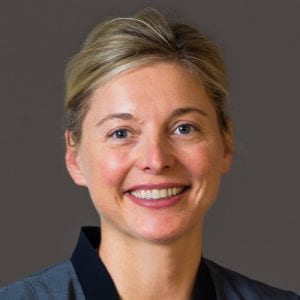 f Data and Analytics Officer at MetLife, and McCombs MBA ’06, was recently recognized for her transformative leadership and contributions to the insurance industry and the Research Triangle.
f Data and Analytics Officer at MetLife, and McCombs MBA ’06, was recently recognized for her transformative leadership and contributions to the insurance industry and the Research Triangle.